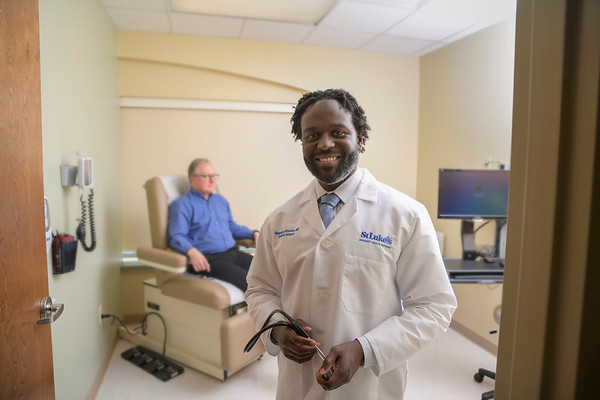Summer fun means something different for everyone. Whether you enjoy hiking up a mountain, sunning on a warm beach, or playing with the kids and grandkids, everything is a little easier—and more enjoyable—when you’re not carrying extra pounds.
“You’re never too old to benefit from weight loss, and we’re here to help,” said St. Luke’s metabolic and bariatric surgeon Ikemefuna (Ike) Akusoba, MD, of St. Luke’s Weight Management Center. “Weight loss surgery can add years to your life for younger people. For older adults, it can add life to your years by enabling you to enjoy an active lifestyle.” Dr. Akusoba, who works in the Stroudsburg office, has performed metabolic and weight loss surgery for patients with obesity in their 50s, 60s, and 70s, many of whom may have 20, 30, or even 40 years left to enjoy life as a thinner person. His oldest surgical patient was 74.
Dr. Akusoba shared the story of a patient in his early 70s who enjoyed spending time with his friends but missed out on their weekly hikes because his excess weight caused joint pain and made it difficult to keep up. His weight also caused acid reflux, a condition in which stomach acid repeatedly flows back into the tube connecting the mouth and stomach, called the esophagus. That all changed after surgery.
“His reflux was gone, and he no longer needed joint pain medications,” Dr. Akusoba said. “But the biggest advantage was spending more time with his friends—something he treasured. Many of my patients do everything they should be doing to lose weight. They eat right, exercise, limit alcohol, and don’t smoke, and they still can’t lose weight. It’s particularly rewarding when an older person who has struggled with their weight all their lives can finally shed the pounds following weight loss surgery.”
St. Luke’s Weight Management Center offers surgical, endoscopic, and medical weight loss options. In all programs, a team of medical professionals, including physicians, dietitians, behavioral health specialists, social workers, and exercise physiologists, uses a guided approach to help you lose weight and keep it off.
Weight loss occurs when you burn more calories than you ingest. But if it’s that simple, why do more than 42% of American adults suffer from obesity?
“There’s a lot more at play,” Dr. Akusoba explained. “A whole slew of things determines our body composition and what we weigh,” he said, adding obesity is a chronic disease that carries a huge stigma in our society. Many people blame people with obesity for their condition.
“That’s unfair,” he said. “We don’t blame people for developing diabetes, high blood pressure, or heart disease. We have to stop blaming people for having obesity.”
Genetics is an important factor. If you have a parent with obesity, your risk of developing obesity is 50% and 80% if both parents have it—even if you were adopted and never lived with your paternal and maternal parents.“It’s gratifying when you can help entire families,” said Dr. Akusoba, who has treated
multiple members of many families, including siblings and parent-child combinations. Environment and the type of work you do affect your weight. Also, your body fights weight loss.
“Fundamentally, when you lose weight, your metabolism slows down, and when your metabolism slows down, you have to eat even fewer calories to maintain the lost weight,” he said. “So, you must eat an entire meal less than somebody who didn’t have to lose weight. I have had patients tell me they exercise three hours a day. That’s hard to maintain indefinitely. Professional athletes don’t even exercise three hours a day.”
The medical or non-surgical program uses medically supervised weight loss methods proven through evidence-based medicine to provide the safest, most effective weight loss solutions. Three program options are available and may include medications recently improved for weight loss called GLP-1 agonists, a class of drugs that help lower blood sugar levels. Injected daily or weekly, they include Saxenda, Ozempic, Wegovy, Mojuaro, and Zepbound. Many more are in the pipeline.
“It’s nice we finally have highly effective medications to treat obesity,” he said. Many patients can lose a significant weight on these drugs. But they are not a cure-all. The downsides include the cost and the fact that most people must continue taking them for their lifetime or risk regaining weight. Some people experience side effects, such as diarrhea, constipation, stomach pain, nausea, and vomiting. GLP-1 medications are ineffective for 15–20% of people.“If you’re looking to lose a large amount of weight and
keep it off, surgery is still the gold standard,” Dr. Akusoba said. St. Luke’s Weight Loss Center offers several types of metabolic and weight loss surgery, all of which are effective.
Age is not a consideration when insurers determine eligibility for coverage of weight loss treatment, he said. Body mass index (BMI)—the ratio of weight divided by height—is used to determine insurance coverage for weight loss treatment. Many insurers cover GLP-1 medication for people with a BMI of 27 or above with medical conditions or 30 and above without. Traditionally, people with BMIs of 35 to 39.9 with health conditions, or 40 and above without, qualify for surgery. However, most insurance companies have lowered eligibility to a BMI of 30-35 with conditions or 35 without.
“That means we know surgeries are highly effective in treating obesity, and patients with lower BMI are deriving great benefits with low risk,” he said. “You can see, there’s now an intersection of people with lower BMIs who can be treated with medicine or surgery. That’s where a conversation with the medical provider comes into play.”
For example, if someone has early-stage diabetes, and you start them on a diabetes medication, they’ll be on that medication for the rest of their life. However, if you treat that same person with surgery, they can live a very long time without having to take diabetes medication.
“We go from treating a condition to having that condition vanish away from the medical chart,” he said. “If you have early-stage diabetes, you will leave the hospital with significantly reduced diabetes medications, or none at all. People with later stage diabetes will decrease medication.”
When considering a surgical or non-surgical option, Dr. Akubosa encourages anyone of any age to contact St. Luke’s Weight Management Center, with locations in Allentown, Bethlehem, Palmerton, Phillipsburg (NJ), Stroudsburg, and Tamaqua.
“It’s not one-size-fits-all,” he said. “We ensure that the patient chooses the weight loss option that best aligns with their goals and health condition. If you can dream it, go for it, and we’ll be here to help you.
For more information, contact St. Luke’s Weight Management Center or visit sluhn.org/weightloss. You can also attend virtual or in-person weight loss information sessions. For dates, locations and times, visit the calendar at sluhn.org.






